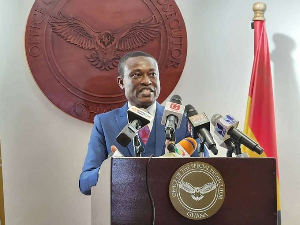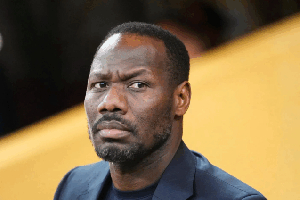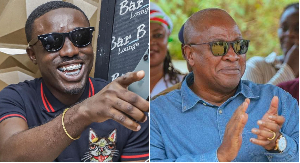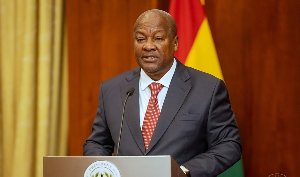I am an Ashanti, he is an Ewe, she is a Fante, and they are northerners: and so what!! It is a pity that we have allowed tribe, ethnicity, political affiliation, etc. to set us against each other. As a people, we refuse to learn, and thus are not able to grow; we refuse to think and as such are not able to develop. One of the most visible elements in under-development, in my estimation is when a nation or society allows tribal bigotry to reign in their midst. Anywhere you spot that people are ethnocentric, there is nothing special that goes on there. This is because the various groups allow their tribe, religion, etc. etc. to blind them from seeing things objectively. These individuals might be educated, but not intelligent; they might be living in a civilized society, but not civilized; they might be renowned, but not refined.
Although, a lot has been said and written about tribalism in our body politic, I would also like to contribute to it since it is a delicate issue that has to be handled with circumspection and tact. In doing so, I do not want my write-up to be more of the same, but rather a purple patch that has the effect of instilling in our soul the appreciation of tribal affiliation as a distinct social feature in societies that is needed to promote progress and development. In a study conducted by Robin Dunbar (1998) at the University of Liverpool, he indicated that primate brain size is dependent on social group size. His conclusion was that the human brain can only comprehend a maximum of 150 individuals as fully developed, complex people. Malcolm Gladwell skillfully expatiated on this observation in his bestseller—the tipping point. Thus, according to these studies, "tribalism" is in a way an inescapable fact of human neurology, clearly because the human brain is not adapted to working with large populations. Beyond a hundred and fifty, the human brain must make use of some combination of hierarchical schemes, stereotypes, and other simplified models in order to understand so many people. And one efficient way of using permutations of hierarchical schemes and some of these useful simplified models is the reason why we go to school; isn’t it? If this is the case, why do some of our politicians and educated elites in the country or on the continent are the ones that promote tribal bigotry? Here is the answer: they cash in on the ignorance of the majority unlettered folks to realize their parochial and unholy interests!
Why do we go to school? This question appears to be very simple on the face value, but it is not. We go to school to receive education, which is meant to make us complete and entire. In education we talk of the three Hs—head, heart, and hand. The educated person is expected to embody all these qualities which are the hub of education. Apart from the cognitive and practical components of education, the affective component—heart, for my money is the cutting edge of all education. The saddest reality is that those who promote extreme tribalism are those who are supposed to know better; those who pride themselves to have sat within the four walls of the classroom. All the tribal and racial conflicts around the globe were not triggered by the unlettered, but rather by some of the so-called educated elite. Why then should we waste precious time to receive education if we do not intend to use it to promote unity and development?
Now, let’s look at the substantive issues: Is it wrong for a particular tribe or region to dominate a particular government? If I am an Ashanti and held a ministerial position in the former administration—NPP—what is the big deal about that. On the other hand, what prevents an Ewe or a Northerner from holding a ministerial portfolio in the NDC administration? Why should politicians resort to playing on people’s emotions to win political power? Don’t they realize that the beauty of politics lies in the use of constructive debating of issues, explanation of the channels of realizing designated programs and policies geared in improving the lots of the people, and not the reliance on ethnocentrism?
During the 8 year rule of the prior administration, she was accused by key figures in the NDC of being tribalistic for having a lot of Ashantis or Akans holding ministerial and other public service positions. The same is being said of the ruling NDC administration by loyalists of the NPP for having a lot of Ewes dominating the government. Assuming the concerns raised are true, which are obviously baseless, except to win political power, what’s wrong about that? Are they not citizens first, before their tribal or political leanings? What these promoters of tribal prejudice fail to tell us, and I think is very important, is whether those people who are accused of holding their positions as a result of tribal considerations are qualified in terms of competence and ability to deliver. If they cannot tell us the bases of their appointments, and instead, use their tribe or ethnicity as the criterion for their appointments just because of the eccentric nature of their names or their geographic origins, then I think they are deliberately and diabolically doing the nation a monumental disservice. The protagonists of this barbaric act have got to stop this path they are treading, and instead think of fostering peace and unity in the country.
The most worrying aspect of those playing the tribal card in our body politic is that they know pretty well that they are being dishonest. They do not give a damn if their tribal politics brings a devastating consequence on the country. They are able to spot a few individuals from a particular tribe or region, but fail to show the broader picture. If this is not dishonesty, tell me what it is. What a shame!! Why are they dishonest and anti-progress? This is because they intentionally refuse to tell us whether these people holding these positions were selected based on merit or any other indicator. The fact that I am Ewe or Ashanti or Fanti or Frafra or kwahu etc. etc. holding a public office does not necessarily mean that the criterion used was nepotism. Get it?
As indicated previously, those playing the tribal card might have gone to school, but not educated; or might be educated, but not intelligent. The educated politician or public office holder, who is also intelligent, will not play the tribal card to attain political power. This is because they know that progress and development lie in the strength of diversity. They know that there is no NPP Ghana, no NDC Ghana, no CPP Ghana, no Ewe Ghana, no Ashanti Ghana, no Dagomba Ghana, etc. etc., instead, a united Ghana: a country with a rich diversity. Those, who disingenuously stoke the tribal flames, should realize that their actions have the potential of resulting in one or all of the following:
First, stalling our quest to progress—Those who play the tribal card should understand that their diabolical intention in trying to set one tribe against the other in order to capture political power has the potential of stalling the political and economic strides we seek to achieve in the country. What we need to do in order to put the country on the pedestal of prosperity should be done regardless of where one comes from. If I come from the Volta region and called upon to serve in the administration of the NDC, what is the fuss about that; if I hail from the Ashanti or eastern region and served in the NPP government, so what? The question we should be asking ourselves instead of being disingenuous in playing the tribal card to the disadvantage of the country is whether the holders of portfolios in the respective administrations are qualified and capable in holding those positions. If a government is accused of being tribalistic just because some people from a particular tribe or region are serving in that administration, then we are by and large preventing or denying qualified persons from partaking in the development of the country.
Second—The bigots in the country are gradually preparing the ground for ethnic cleansing. It is worrisome that those who are expected to know better, are the very same people who are wickedly playing the tribal card. They are fully aware that it was politicians, the so-called educated elites, and not the ordinary people on the street that instigated the ethnic cleansing in Rwanda, and other unfortunate countries in most developing countries. So you ask yourself, why are these people, who have received education elevate ethnocentrism in the country? Why are these politicians, as a result of their desire to capture political power disregard common sense, throw the peace and unity of the country to the dogs? All those who are playing the tribal card should bury their heads in shame. Whether I am Ewe, Ashanti, Frafra, Fante, etc. etc., am I not a Ghanaian? Even those who did not get the opportunity to go to school will not do what some of the so-called “educated” and “enlightened” politicians in the country are doing. What is our learning curve in relation to the negative consequences tribal bigotry has brought to most of the countries on our continent? Instead of using our acquired knowledge to promote the development of the country, we are rather using it to destroy ourselves because of our personal ambitions. No wonder F. W. Botha, the former president of the republic of South Africa said in 1985 during a cabinet meeting that “Give them [black men] guns and they will kill each other.” The promotion of bigotry and its negative consequence of destructiveness give credence to this unfortunate quote about the black man.
Third, they are imbibing hatred in the minds and souls of the children and youth who hold the future of the country. The end result of the promotion of tribalism or ethnocentrism is deep-seated hatred, which has the capacity of leading to something egregious—genocide. Instead of preaching and promoting tribalism in the country, let us endeavor to preach and advance peace and unity. Let us imbibe in the younger generation that we are one people with a common destiny. Let us consciously and intentionally preach to the youth the message that regardless of where we come from, regardless of the peculiarity of our names, WE ALL BELONG TO GHANA. We belong to a nation where one’s political affiliation or religious affiliation or tribal categorization is just a symbol of diversity in a collectivistic culture. This is what our founding fathers stood and fought for; and we need to promote in order to succeed in produce a better Ghana for ourselves and generations unborn.
In winding up, I would like to admonish our politicians and leading figures of the various political parties, especially the NPP and NDC to be circumspect about their utterances regarding tribal issues. They should understand that before our adoption of multi-party democracy, there was a country called Ghana (Gold Coast)—which is bigger and more important than their aspirations to capture political power. They should never forget that in their quest to steer the affairs of the land, the unity and progress of the country should never ever be compromised because of their personal aspirations. God bless Ghana!!
Source: Kingsley Nyarko, PhD, Psychologist & Educational Consultant, IAF- Munich, (kingpong73@yahoo.com)
Opinions of Wednesday, 3 February 2010
Columnist: Nyarko, Kingsley














